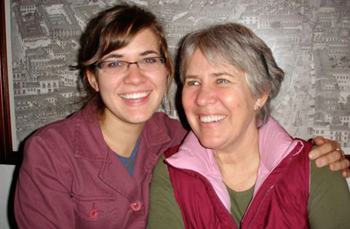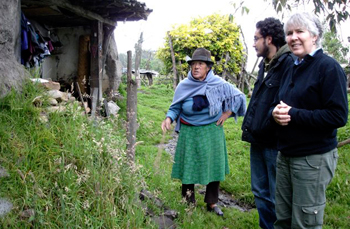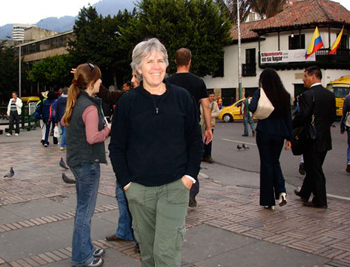Mother of young woman in mission learns about life in Colombia
While Evita Krislock was excited to hear last year that her then 23-year-old daughter, Audra, was joining the Episcopal Young Adult Service Corp, she was dismayed to learn her daughter would be in Colombia.
 |
Evita Krislock and daughter, Audra |
She had stereotypes to overcome about that country, and now wants to share her insights about Colombia and her experience as the parent of a young adult mission volunteer.
Audra had studied a year in Ecuador while at the University of Idaho, but Evita had concerns about her security, traveling alone to the drug capital of the world, a place of violence, kidnappings and massacres.
“We read the news and, as hard as we tried, we were not able to fish from the depths of our knowledge, something positive about Colombia,” Evita said. “Many fears and concerns surfaced.
“As the mother, the dramatic change from having our daughter a quick call away to losing easy access with one of our precious children was difficult to fathom, although these fears were balanced with wonder and pride in seeing her ability to step out and live into her own discovery process,” she said.
Evita’s experience sheds light on how mission experiences of young people through their churches has impact that extends to and changes their families as well as them.
Evita knew of the Episcopal Church on the wider scale, the variety of projects and missions, and the richness of possibilities they hold.
Her fears were further dispelled in January when she visited Audra, the Episcopal Church’s first mission volunteer in Colombia.
Although Evita heard by emails, Skype and Audra’s blog about her work teaching English to people on the streets and to children at mission schools, Evita’s three-week visit gave her a chance to learn in person about the people, the church and the communities.
 |
Evita Krislock visits Colombia |
“I spent time there doing reflective listening, listening with my heart and just being present,” she said.
What she heard was the people’s desire that North Americans know that life in Colombia is more than the violence and fear that was Evita’s long-distance impression.
“The fears are cultivated by the media and our own tendency to fear the unknown—in this case Colombia,” Evita said. “What we have heard for the past 40 years has been the breaking news stories about hostages, drug lords and guerrillas—all negative.
“What we have not heard is that the guerrilla group has been nearly cut in half, that 10 years ago a family could not take a weekend trip outside the city because it was a red zone and now they can, nor how safety has significantly increased over the past 10 years.”
Evita added that “we don’t hear about the wonderful things about the country,” the “incredible” people, its biodiversity or its quality coffee.
“These are not the stories that make it into our homes,” she said, asking, “How do we change that? How do we become more compassionate and realize we need to look beyond the news to educate ourselves and others?
“We need to consider how we perceive other countries, and how other countries perceive us, with the news and media that enter homes all over the globe. Where and by whom are our perceptions of reality created?” she asked.
Evita knows that part of the change and education will come as people like her daughter push through fears society engenders and break down blockades with open minds and hearts to spread “the message that is it is more important to love rather than fear.”
Evita felt overwhelmed by the “love and care” given to Audra by everyone she knew, everywhere she went.
Living in Morton near Mt. Rainier for grade school and junior high years Evita had attended the Episcopal church, but said everyone in the community attended everyone’s church—Protestant and Catholic. In her high school years in Bellevue, she attended the Episcopal Church of the Resurrection.
While studying fine arts for the bachelor’s degree she earned at Washington State University in 1976, Evita attended St. James. When she came home once and told her parents she was learning about Buddhism and not going to church, they said they felt sorry for her.
“It was my chance to grow and learn, so I could claim my faith as my own,” Evita said.
So she knew that God would be with her daughter, too.
After college, Evita worked with Burlington Railroad in Yakima and transferred in the spring of 1977 to Spokane, where she married, had three children, stayed at home and volunteered at school and in Christian education at Holy Spirit Episcopal, now the Church of the Resurrection.
Involvement in youth ministry led her to become executive director of Camp Cross and youth ministries coordinator for the Episcopal Diocese of Spokane from 2000 to 2007.
She now attends the Cathedral of St. John where she is on the Cathedral and Diocesan Care for Creation Committee. She is also president of the Faith and Environment Network.
With knowledge about the “bigger church,” Evita still struggled with her daughter’s adventure, and with dealing with the fears and concerns of family, friends and associates.
Part of the journey for Audra, too, was to understand that the fears expressed by friends and family came from their love and concern for her.
 |
| Evita in a plaza in Colombia |
Audra left last September and returns Sept. 10. The first few months she lived with a family and then moved in January to an apartment in the basement of the office of the Episcopal Diocese.
Seeing her work and visiting the Diocesan office in Bogota, Evita realized it was like the diocesan office in Spokane. She was also amazed at how similar Colombia was to the USA in other ways—food, culture, landscape, rich history and parents caring for children in buses, restaurants and markets, or participating in Scout awards in a park.
Although Evita’s Spanish was limited, she felt welcomed and included without hesitation and often spoke “spanglish” with others.
“What gracious, warm, honest and loving people. I allowed the fear I once had to leave and what replaced it was warm and life giving,” Evita said.
“Our daughter, now 24, possesses strength and courage that serve her well. She continues to teach us and break down barriers.
“Her spiritual journey is rich and filled with an understanding of God’s love and presence in her life,” Evita said, noting that the experience has been priceless for the entire family, because they have learned to “just love the people and allow ourselves to be forever changed.”
For information, call 922-0180 or visit at adventurewithaudra.blogspot.com.
Copyright © September 2009 - The Fig Tree




